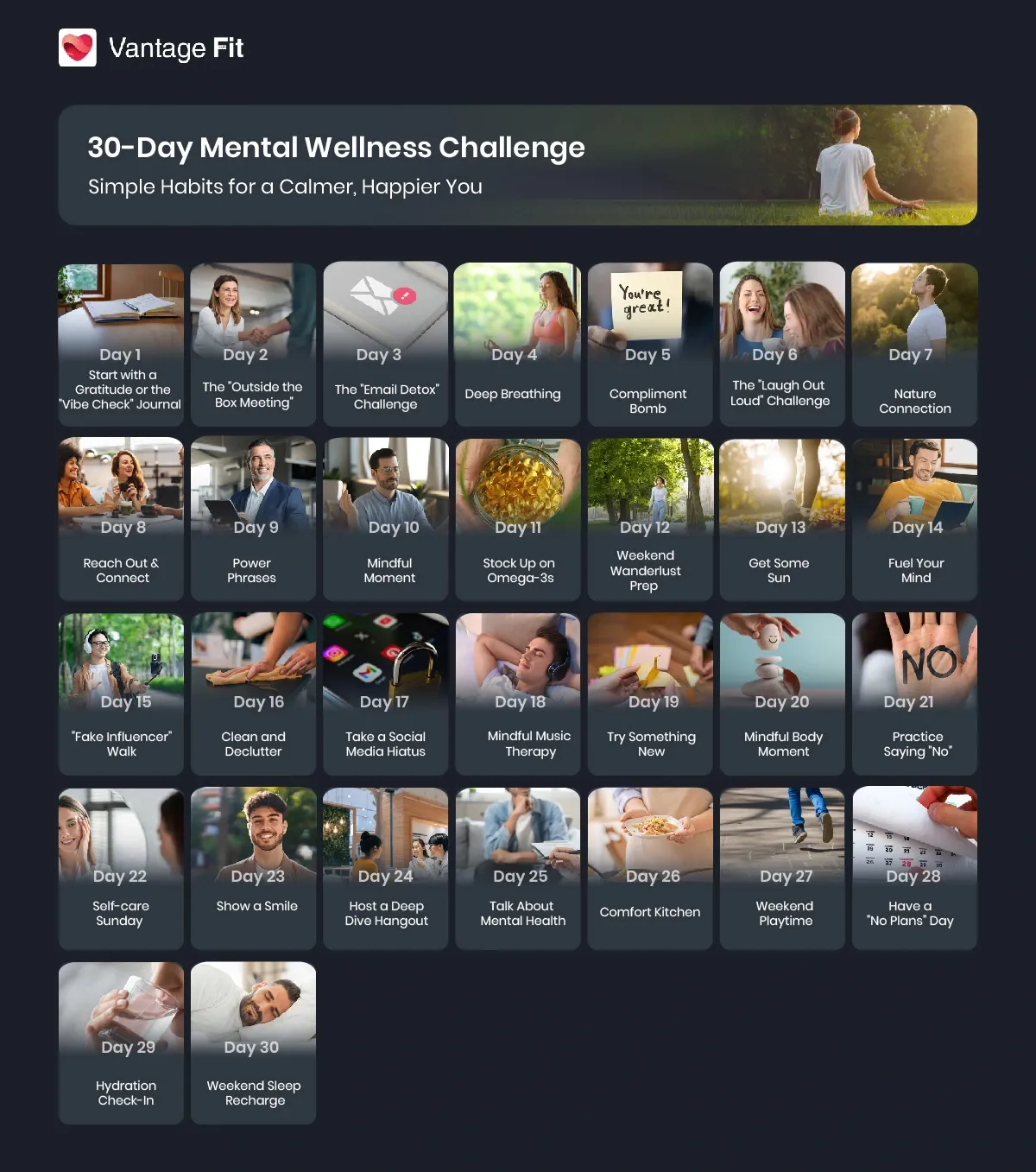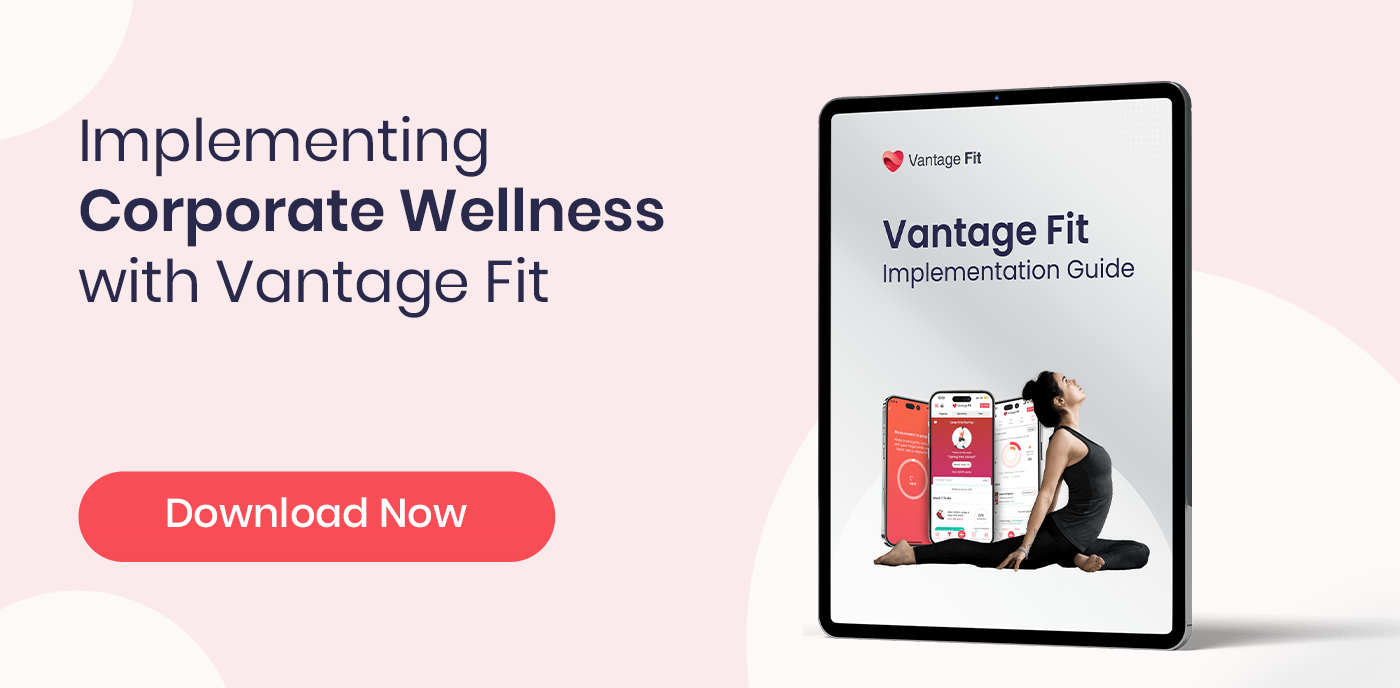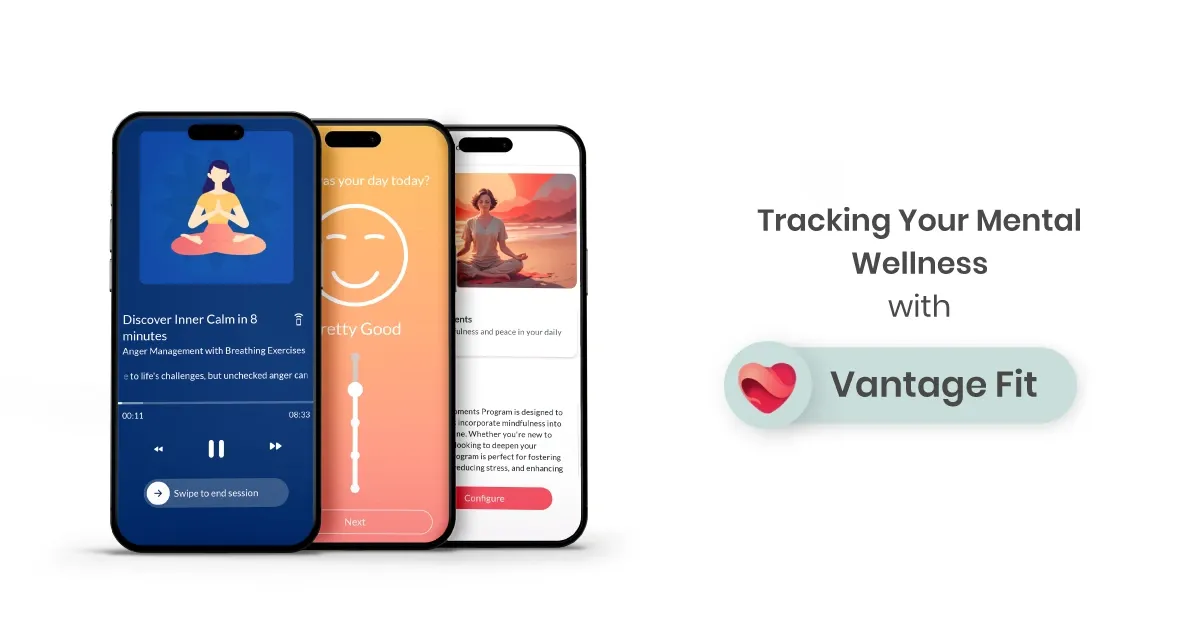30-Day Mental Wellness Challenge: Simple Habits For A Calmer, Happier You
Did you know that 1 in 5 adults (according to the National Alliance on Mental Illness (NAMI) struggle with mental health issues? In today's fast-paced world, taking care of your mind is just as important as taking care of your body.
Whether you're juggling a 9-to-5 job, side hustles, or just trying to adult, it's easy to feel overwhelmed. That's where the 30-Day Mental Wellness Challenge comes in.
This challenge will help you build sustainable habits that boost your mental well-being. Each day, you'll tackle a small, actionable task that takes 5-10 minutes—perfect for even the busiest schedules.
The best part? You can adjust the challenge to fit your life. Whether you want to do it in 7, 14, or 21 days, it's all about what works for you.
Ready to take the first step toward a calmer, happier you? Let's get started.
Week 1: Building Awareness & Grounding Habits For A Calmer Mind
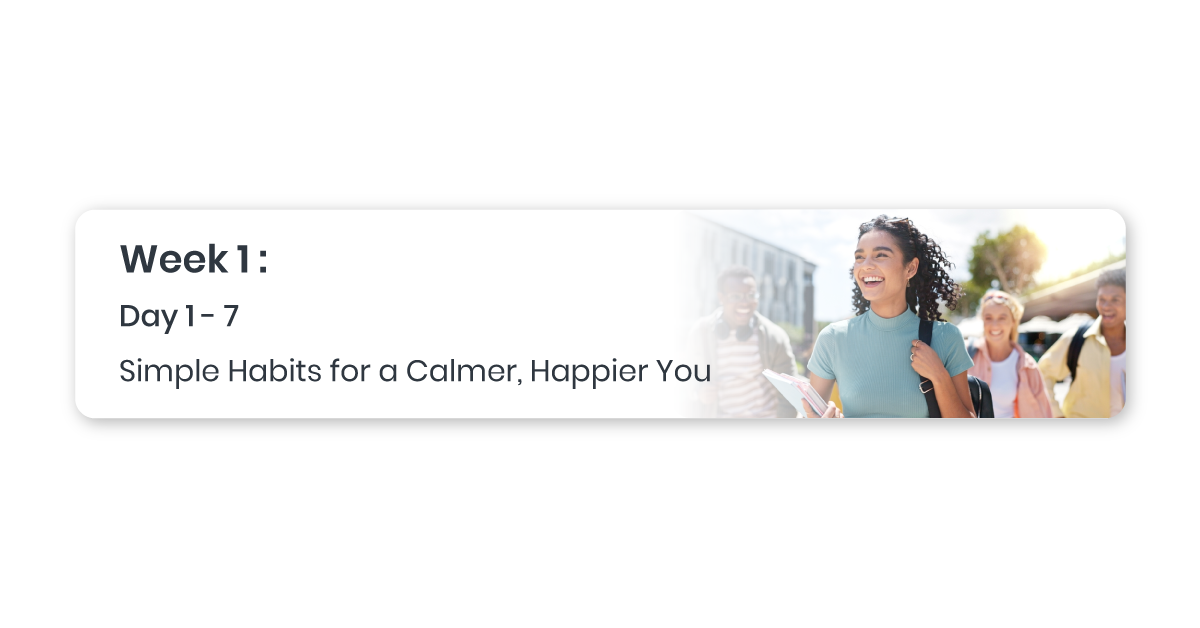
This week is about slowing down, checking in with yourself, and starting with intention.
Day 1: Start with a Gratitude or the "Vibe Check" Journal
Time Required: 5-10 minutes
Task:
-
Write down three things you're grateful for in a journal or notes app.
-
You can also snap photos of things you're grateful for.
Why it's good for you:
- It shifts your mindset from stress to appreciation, boosting emotional resilience.
Day 2: The "Outside the Box Meeting"
Time Required: Depends on meeting length
Task:
- Suggest a walking meeting with a colleague or take a solo walk while brainstorming.
Why it's good for you:
- It boosts creativity, reduces stress, and gets you moving.
Find a park or trees to maximize the chill vibes.
Check out our blog How to Host Effective Walking Meetings and Why?
Day 3: The "Email Detox" Challenge
Time Required: 30 minutes
Task:
-
Set a "no-email zone" for 30 minutes after lunch.
-
Use the time to meditate or relax.
Why it's good for you:
- Boosts focus and reduce burnout.
Day 4: Deep Breathing
Time Required: 5-10 minutes
Task:
-
Practice the 4-7-8 breathing technique: inhale for 4, hold for 7, exhale for 8.
-
Try to touch the roof of your mouth behind your front teeth.
-
Exhale and make a 'whoosh' sound, expelling all the air through your mouth.
-
Quietly breathe in through your nose for 4 seconds.
-
Hold your breath for 7 seconds.
-
Forcefully "whoosh" air out through your mouth for 8 seconds.
-
Repeat 3 times.
Why it's good for you:
- Calms the nervous system, reducing stress and anxiety.
During guided sessions, you can use an app to avoid distractions and focus on your breathing. Take a few minutes to breathe deeply and let the tension melt away—think of it as a mini spa session for your mind!
Day 5: Compliment Bomb
Time Required: 5 minutes
Task:
- Compliment three people today—make them meaningful!
Why it's good for you:
- Increases happiness and strengthens social bonds.
Watch their faces light up—it'll make your day too!
Day 6: The "Laugh Out Loud" Challenge
Time Required: 5-10 minutes
Task:
-
Watch a funny video or recall a hilarious memory.
-
Search for your favourite comedian on YouTube or call a friend who always cracks you up. You can even try watching animal bloopers—those never fail!
Why it's good for you:
- Releases endorphins, reducing stress.
Listen to our podcast on: The History of Laughter Yoga and its journey across the World
Day 7: Nature Connection
Time Required: 15 minutes
Task:
-
Spend 15 minutes outside observing nature.
-
You can go for a walk, chill in a park, or even sit and look around at nature wherever you are.
Why it's good for you:
- It lowers stress hormones and boosts creativity.
Week 2: Building Emotional Resilience For A Calmer Mind
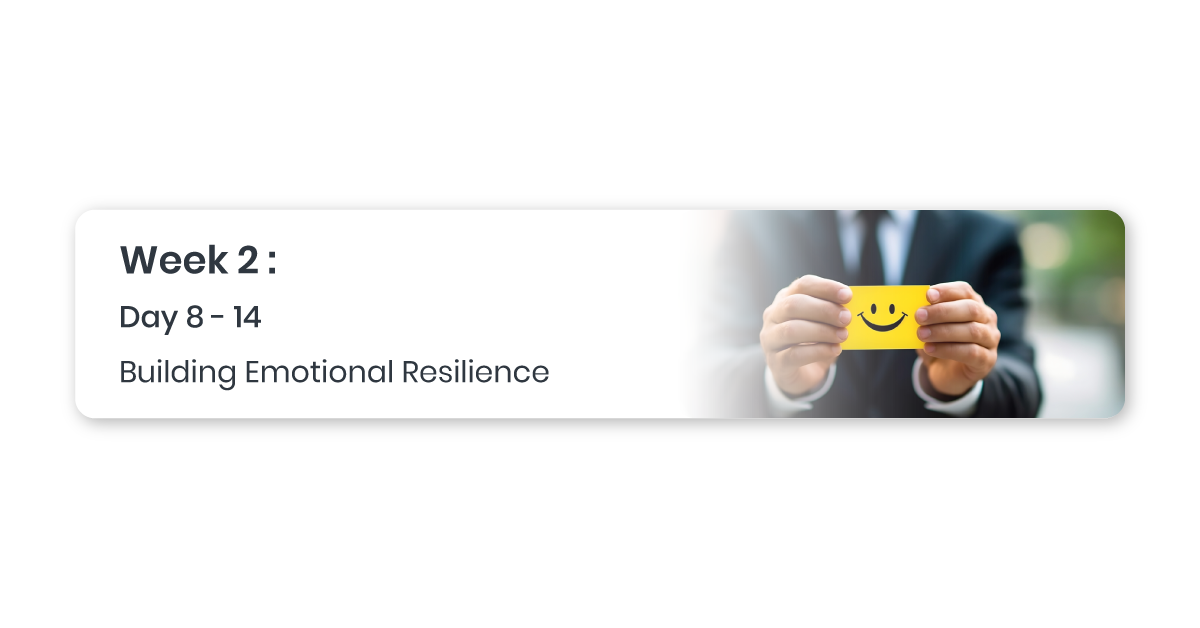
Enhance emotional intelligence and resilience through targeted activities.
Day 8: Reach Out & Connect
Time Required: 10-30 minutes
Task:
- Reconnect with someone you haven't spoken to through a call or FaceTime.
Why it's good for you:
- Strengthens relationships and brings joy to you and the person you connect with.
Day 9: Power Phrases
Time Required: 5-10 minutes
Task:
-
Repeat three positive affirmations each morning or evening, like "I am capable," "I am strong," or "I am worthy."
-
Find a quiet moment, ideally in front of a mirror, and say these statements aloud with intention.
-
Even if it feels unnatural initially, try to speak with conviction and focus on the meaning of the words.
-
Practice it every morning or right before going to bed.
Why it's good for you:
- Boosts self-esteem and shifts negative thinking to positive.
Day 10: Mindful Moment
Time Required: 10-15 minutes
Task:
-
Download or open a mindfulness app like Calm or Vantage Fit.
-
Select a guided meditation for around 10 minutes.
-
Find a comfortable, distraction-free spot to sit or lie down.
-
Listen to the app's guidance and focus on the present.
Why it's good for you:
- Reduces stress, improves focus, and promotes emotional well-being.
Day 11: Stock Up on Omega-3s
Time Required: No extra time required (dietary change)
Task:
- Add omega-3-rich foods (e.g., fish, walnuts, flaxseeds).
Why it's good for you:
- Omega-3s are essential for brain health, helping improve mood and reducing symptoms of depression and anxiety.
Day 12: Weekend Wanderlust Prep
Time Required: Depends on the duration of the outing
Task:
- Plan a mini adventure for the weekend, like visiting a park or exploring a new neighbourhood.
Why it's good for you:
- Planning fun activities gives you something to look forward to and boosts your mood.
Day 13: Get Some Sun
Time Required: 10-15 minutes
Task:
- Spend time outdoors to soak up some Vitamin D.
Why it's good for you:
- Vitamin D helps improve mood and reduces stress, especially during winter when sunlight is limited.
Day 14: Fuel Your Mind
Time Required: 20-30 minutes
Task:
- Listen to an inspiring podcast or audiobook during your commute or workout.
Why it's good for you:
- It makes your commute or workout time more productive and motivating.
Check out our blog 10 Best Mental Wellness App
Week 3: Mindful Living For A Calmer Mind
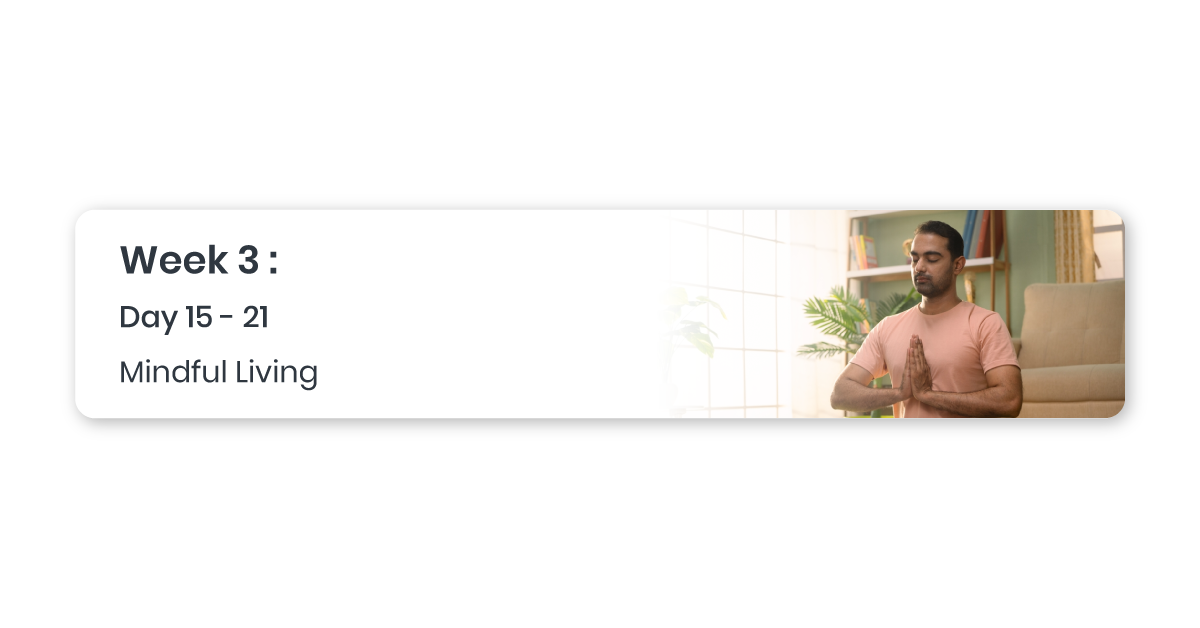
Integrate mindfulness into daily life to reduce stress and improve emotional focus.
Day 15: "Fake Influencer" Walk
Time Required: 10-15 minutes
Task:
-
During your lunch break, go for a walk around your local area.
-
While walking, imagine you are a vlogger, narrating your experience and highlighting fascinating aspects of what you see.
Why it's good for you:
- Encourages mindful observation and reduces stress.
Day 16: Clean and Declutter
Time Required: 30 minutes
Task:
- Declutter your space—start with your desk or a small room.
Why it's good for you:
- A decluttered space can create a sense of calm and reduce stress.
Check out our blog How to Create and Implement Stress Management Programs in the Workplace?
Day 17: Take a Social Media Hiatus
Time Required: Entire day
Task:
-
Unplug from social media for 24 hours.
-
Select a new hobby that you've been curious about or that sounds appealing.
-
Try something new that doesn't involve screens—like painting, gardening, or baking.
-
Focus on the process and the sensory experience rather than the outcome.
Why it's good for you:
- Social media breaks help you reduce stress, avoid unfavorable comparisons, and maintain a healthier mental state.
Day 18: Mindful Music Therapy
Time Required: Depends on your playlist
Task:
- Create a playlist of empowering songs that motivate you and listen throughout the day.
Why it's good for you:
-
Music boosts mood increases confidence and energizes you.
-
Music therapy reduces depression symptoms by 25%.
Listen to our podcast on: How Movement Therapy Can Improve Employee Wellness?
Day 19: Try Something New
Time Required: 30 minutes
Task:
-
Learn a new hobby, craft, or skill.
-
Try a new workout class or follow a fitness video on YouTube.
Why it's good for you:
- Trying new things stimulates dopamine production, helping you break out of routine and improve your mood.
Day 20: Day 20: Mindful Body Check
Time Required: 5 minutes
Task:
-
Lie down comfortably and close your eyes.
-
Take a few deep breaths.
-
Gently bring your attention to the sensations in your body, moving from your head to your toes.
-
Simply notice any feelings without judgment. Imagine any tension softening as you breathe.
Why it's good for you:
- Quickly cultivates body awareness and promotes relaxation, helping to release held tension.
Day 21: Practice Saying "No"
Time Required: Ongoing
Task:
- Practice saying "no" to tasks or commitments that don't align with your priorities.
Why it's good for you:
- Setting boundaries is key to preserving mental energy and maintaining emotional well-being.
Week 4: Self-Care, Connection, and Sustaining Wellness
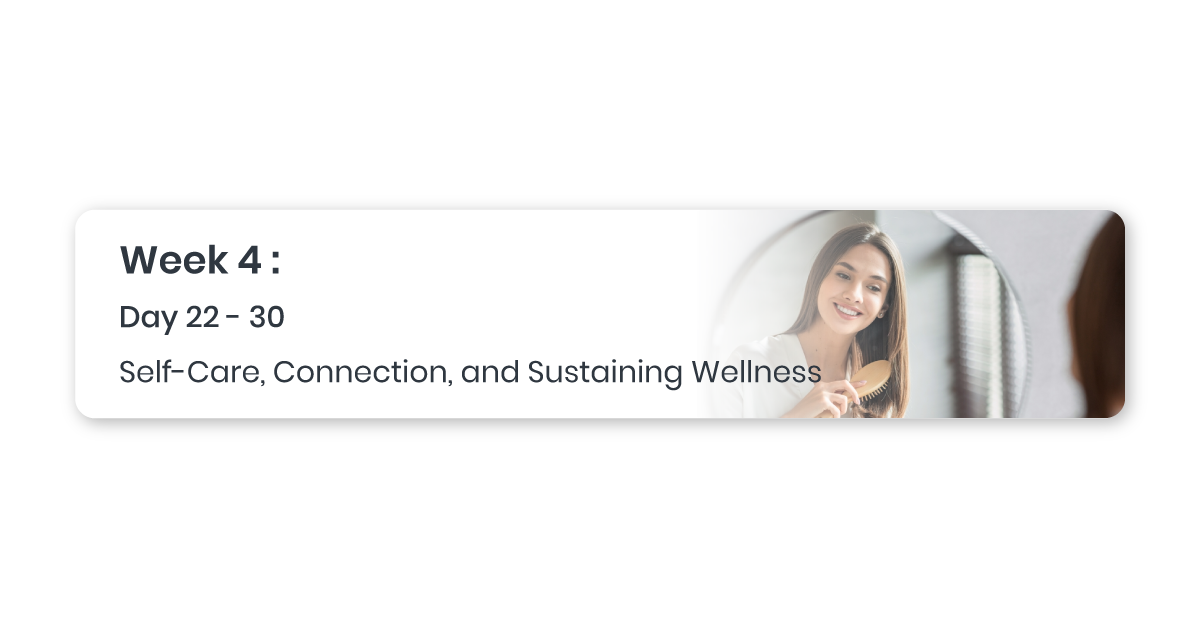
Prioritize self-care, nurture social connections, and build long-lasting mental wellness habits that promote long-term well-being.
Day 22: Self-care Sunday
Time Required: 30-60 minutes
Task:
-
Dedicate time on Sunday for a self-care routine—apply a face mask, watch a favourite show, or relax.
-
When the time comes, create a comfortable and relaxing environment and allow yourself to enjoy the experience fully.
Why it's good for you:
- Prioritizes relaxation, reduces stress, and recharges you for the week ahead.
Day 23: Show a Smile
Time Required: Ongoing
Task:
- Smile at yourself in the mirror and at others throughout the day.
Why it's good for you:
- Smiling triggers the release of endorphins, helping you feel more confident, positive, and emotionally at ease.
Day 24: Host a Deep Dive Hangout
Time Required: 30-60 minutes
Task:
- Arrange a "no small talk" hang out with friends or roommates, encouraging meaningful conversation.
Why it's good for you:
-
Strengthens connections and increases emotional intimacy.
-
Social support reduces depression risk by 50% (Source: A study published in the Journal of Affective Disorders)
Day 25: Talk About Mental Health
Time Required: Ongoing
Task:
-
Engage in an open conversation about mental health with friends, family, or colleagues.
-
Share your thoughts and experiences to normalize the conversation.
Why it's good for you:
- Talking about mental health reduces stigma, provides support, and creates a safe, open environment where others can feel comfortable sharing.
Day 26: Comfort Kitchen
Time Required: 5-15 minutes
Task:
- Cook and enjoy a comforting dish that brings you joy, like mac and cheese or ramen.
Why it's good for you:
- Comfort food promotes positive emotions and provides a nurturing experience.
Day 27: Weekend Playtime
Time Required: 10-20 minutes
Task:
- Play childhood games like hopscotch or jump rope with friends or family.
Why it's good for you:
- Boosts mood and relieves stress with playful, nostalgic fun.
Day 28: Have a "No Plans" Day
Time Required: Entire day
Task:
- Spend a day without pre-set plans, allowing yourself to follow your instincts and enjoy spontaneous activities.
Why it's good for you:
- Reduces stress by embracing freedom and flexibility.
Day 29: Hydration Check-In
Time Required: Ongoing
Task:
-
Drink eight glasses of water.
-
Track your intake with Vantage Fit's Water Intake to set reminders and celebrate milestones.
Why It is good for you:
-
Dehydration increases cortisol (the stress hormone) by 18%, worsening anxiety and brain fog.
-
Staying hydrated sharpens focus and stabilizes mood—a simple yet powerful habit for managing mental health challenges.
Day 30: Weekend Sleep Recharge
Time Required: 8–10 hours
Task:
-
Get a full night of restful sleep—aim for 8 to 10 hours over the weekend.
-
Track your sleep using Vantage Fit’s Sleep Log feature to monitor quality and consistency.
Why it's good for you:
- Enhances mood, reduces stress, and supports overall physical and mental recovery.
Tracking Your Mental Wellness with Vantage Fit
Tracking your mental wellness challenges is key to seeing progress and staying motivated. Vantage Fit can help you track these challenges by offering a centralized platform to log your mental wellness activities, such as meditation, mindfulness exercises, or mood journaling.
The app provides progress reports, reminders, and personalized insights, allowing you to stay consistent and make data-driven adjustments to your routine.
By leveraging Vantage Fit's features, you can cultivate a structured approach to mental wellness, ensuring long-term benefits and a healthier mindset.
Summing It Up
Not all wellness challenges are created equal. The key is strategic design, meaningful incentives, and consistent participation. Want to learn how challenges can work for your company?
Frequently Asked Questions
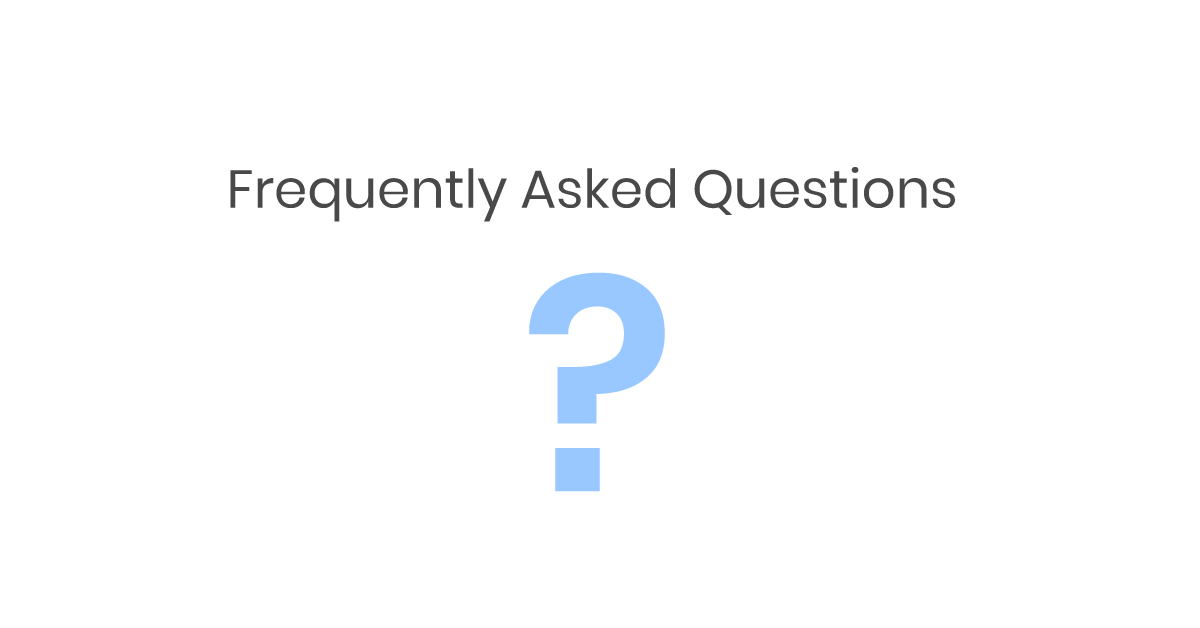
1. What is a mental wellness challenge?
A mental wellness challenge involves daily tasks designed to improve your mental health and overall well-being.
2. What are the key benefits of a mental wellness challenge?
These challenges can reduce stress, boost mood, enhance focus, and improve emotional resilience.
3. Can I modify the challenge to fit my routine?
Yes! You can adjust the challenge to fit your lifestyle, whether you want to complete it in 7, 14, or 21 days.
4. What happens if I miss a day? Should I start over?
Yes, you should continue or start over even if you miss a day. Pick where you left off and continue the challenge at your own pace.
5. Can I combine this challenge with other wellness activities?
Yes! Feel free to integrate this mental wellness challenge with other wellness activities you're already doing.



